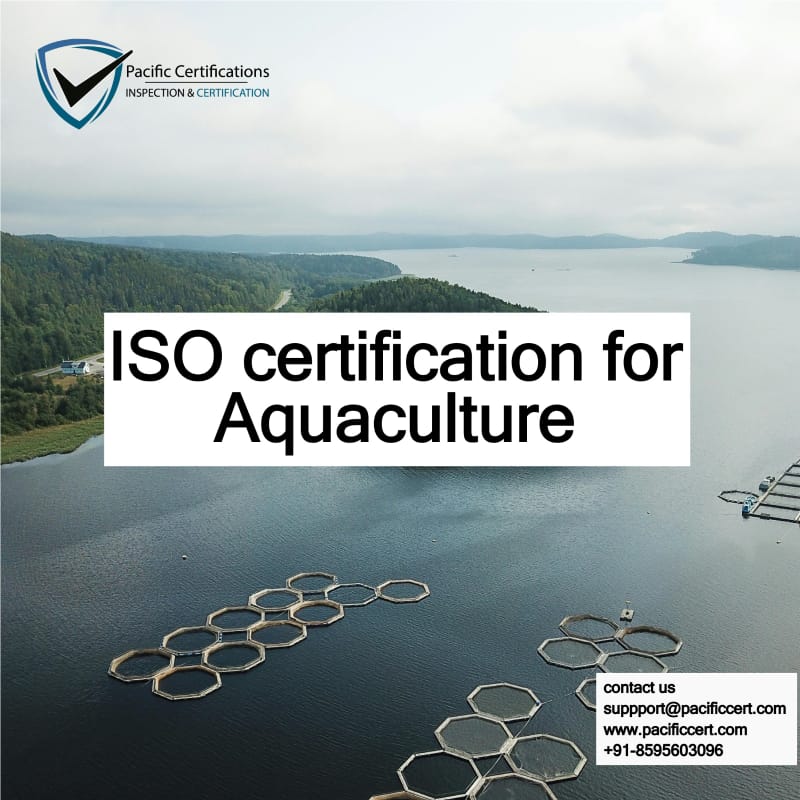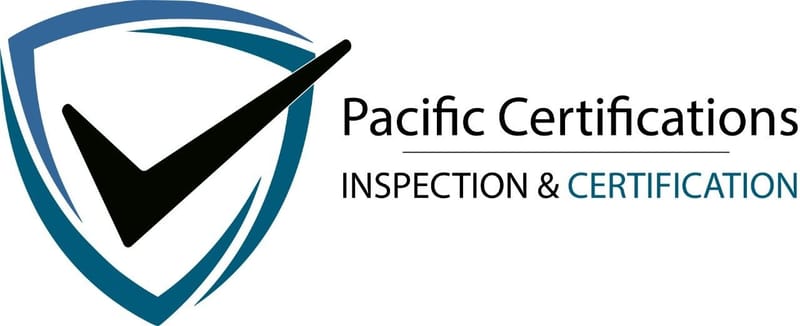ISO Certifications for Aquaculture, Applicable Standards, Requirements and Benefits

Introduction
Aquaculture operates in a biologically sensitive, environmentally regulated, and quality-critical environment where stock health, water quality, feed management, biosecurity, and food safety directly influence productivity, export acceptance, and long-term sustainability. The aquaculture sector includes fish farming, shrimp and prawn farming, shellfish cultivation, hatcheries, feed operations, cage culture, pond-based farming, and integrated aquaculture systems supplying domestic and international seafood markets.
With growing global demand for farmed seafood, stricter food safety regulations, rising concerns around environmental impact, disease outbreaks, antibiotic misuse, and traceability, aquaculture businesses are under increasing pressure to demonstrate structured operational control. Failures in water management, poor biosecurity, unsafe harvesting practices, or weak documentation can result in stock losses, export rejections, regulatory penalties, and reputational damage. ISO certifications provide internationally recognized management system frameworks that help aquaculture operations standardize processes, manage risks, protect the environment, and build confidence with regulators, buyers, and certification bodies.
In aquaculture, trust is built on biosecurity, sustainability, and consistent quality.
Quick Summary
ISO certifications provide aquaculture businesses with internationally recognized frameworks to manage operational and product quality through ISO 9001, ensure food safety across farming and handling stages through ISO 22000, manage environmental responsibilities through ISO 14001, ensure occupational health and safety through ISO 45001, support traceability and supply-chain confidence through ISO 22005, manage business continuity through ISO 22301, strengthen risk governance through ISO 31000, and protect operational data through ISO/IEC 27001 where digital systems are used. These standards support safe production, regulatory compliance, and access to global seafood markets.
For guidance on selecting the most relevant ISO standards for your aquaculture operations, contact [email protected].
Applicable ISO Standards for Aquaculture
ISO 9001: Quality Management System (QMS)
ISO 9001 supports consistent management of aquaculture operations such as pond preparation, feeding schedules, water quality monitoring, harvesting practices, equipment maintenance, and documentation. It helps reduce variability, improve productivity, and strengthen customer confidence.
ISO 14001: Environmental Management System (EMS)
Aquaculture activities directly impact surrounding ecosystems. ISO 14001 helps manage environmental aspects such as water discharge, effluents, sediment, chemical use, biodiversity protection, and waste handling, supporting regulatory compliance and sustainable farming practices.
ISO 45001: Occupational Health and Safety Management System (OHSMS)
Aquaculture workers face risks related to water bodies, machinery, chemicals, manual handling, and outdoor conditions. ISO 45001 provides a structured framework to identify hazards, implement controls, train workers, and prevent injuries and occupational illnesses.
ISO 22000: Food Safety Management System (FSMS)
ISO 22000 is highly relevant for aquaculture businesses supplying food markets. It ensures systematic control of biological, chemical, and physical hazards across breeding, feeding, harvesting, handling, storage, and transportation of aquatic products. It supports compliance with export regulations and buyer requirements.
ISO 22005:2007 – Traceability in the Feed and Food Chain
ISO 22005 supports traceability of fish stock, feed inputs, treatments, harvesting batches, and distribution. It is especially important for export-oriented aquaculture operations and for responding effectively to recalls or regulatory inspections.
ISO 14040: Environmental Management - Life Cycle Assessment (LCA)
This standard is particularly relevant for aquaculture companies focused on sustainability. It involves evaluating the environmental aspects and potential impacts associated with a product, from raw material acquisition through production, use, and disposal.
Click here to find out more applicable standards to your industry
Steps for Certification
Gap Analysis: Identify current practices and gaps in comparison to the ISO standard requirements.
Planning and Implementation: Develop a plan to address the gaps and implement necessary changes in the management system.
Internal Audit: Conduct internal audits to ensure the implemented system meets ISO standards.
Management Review: Review system performance and compliance with ISO standards by top management.
Certification Audit: Choose a reputable certification body as Pacific Certifications, to conduct the certification audit. The audit includes two stages: a preliminary review of the management system documentation (Stage 1) and a detailed examination of the system's implementation and effectiveness (Stage 2).
Continuous Improvement: After certification, continuously improve the management system to ensure ongoing compliance with the standard and enhance overall performance.
For aquaculture businesses, aligning operations with these ISO standards can significantly contribute to sustainable development. It's advisable to work with experienced certification bodies that can provide guidance through the certification process and ensure that the standards are implemented effectively.
What are the Requirements of ISO Certifications for Aquaculture?
Aquaculture businesses seeking ISO certification must establish documented management systems and demonstrate consistent implementation across farming, safety, environmental, and governance functions:
ISO 9001:2015 – Quality Management
Document farming procedures, feeding regimes, and harvesting processes
Define quality objectives related to yield, survival rate, and consistency
Control operational records, logs, and corrective actions
Monitor performance indicators and customer feedback
Conduct internal audits and management reviews
ISO 22000:2018 – Food Safety
Identify food safety hazards across aquaculture processes
Implement prerequisite programs (PRPs) and operational controls
Establish traceability and recall procedures
Monitor critical control points where applicable
Ensure competence and hygiene of personnel
ISO 14001:2015 – Environmental Management
Identify environmental aspects related to water use and discharge
Control waste, chemicals, and effluent management
Monitor environmental performance and compliance
Implement measures to reduce ecological impact
ISO 45001:2018 – Occupational Health & Safety
Identify hazards related to aquaculture activities
Assess risks and implement safety controls
Provide training, PPE, and emergency preparedness
Monitor incidents and safety performance
ISO 22301:2019 – Business Continuity
Identify critical aquaculture operations and dependencies
Conduct business impact analysis (BIA)
Develop continuity and recovery plans
Test and review response arrangements
Tip:Map one complete aquaculture production cycle—from pond preparation and stocking to feeding, harvesting, storage, and dispatch—against ISO requirements to identify gaps early.
For assistance in evaluating your aquaculture operations against ISO requirements, contact [email protected].
What are the Benefits of ISO Certifications for Aquaculture?
ISO certifications provide aquaculture businesses with strong operational and commercial advantages, including:
Improved food safety and product consistency
Stronger compliance with export and regulatory requirements
Better environmental stewardship and sustainability
Reduced disease and operational risks
Improved worker safety and welfare
Stronger traceability and recall readiness
Increased confidence from buyers and regulators
Better access to international markets
Improved operational efficiency and documentation
Long-term business resilience and credibility
Global aquaculture continues to expand as wild fish stocks decline and demand for protein increases. The global aquaculture market is expected to exceed USD 300 billion within a few years, driven by population growth, export demand, and technological advances in farming systems.
At the same time, regulators and buyers are imposing stricter requirements on food safety, traceability, environmental protection, and worker welfare. Aquaculture businesses demonstrating ISO-aligned management systems are better positioned to meet export standards, secure long-term contracts, and operate sustainably. ISO certifications such as ISO 22000, ISO 9001, ISO 14001, and ISO 45001 are expected to be baseline expectations for professionally managed aquaculture operations.
How Pacific Certifications Can Help
Pacific Certifications, accredited by ABIS, acts as an independent certification body for aquaculture businesses by conducting impartial audits against applicable ISO standards. Our role is to objectively assess whether documented management systems and aquaculture operations conform to international ISO requirements, based strictly on verifiable evidence and records.
We support aquaculture organizations through:
Independent certification audits conducted in accordance with ISO/IEC 17021
Objective assessment of quality, food safety, environmental, and safety controls
Clear audit reporting reflecting conformity status and certification decisions
Internationally recognized ISO certification upon successful compliance
Surveillance and recertification audits to maintain certification validity
For ISO certification for aquaculture businesses, contact [email protected] or call +91-8595603096.
Author: Ashish
Ready to get ISO certified?
Contact Pacific Certifications to begin your certification journey today!
Suggested Certifications –
Read more: Pacific Blogs

